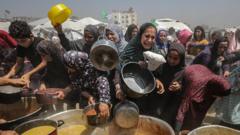A recent assessment from the Integrated Food Security Phase Classification highlights the dire food insecurity situation in Gaza, where 244,000 individuals are facing catastrophic hunger. Despite a temporary ceasefire, renewed military actions and blocked aid have exacerbated the crisis, prompting urgent international calls for humanitarian intervention.
Gaza's Population Faces Critical Famine Risk, Urgent Call for Aid

Gaza's Population Faces Critical Famine Risk, Urgent Call for Aid
A UN-backed IPC report reveals Gaza's 2.1 million residents are at severe risk of famine, driven by an Israeli blockade on humanitarian aid.
A UN-backed assessment has warned that the entire population of Gaza, approximately 2.1 million Palestinians, is facing a "critical risk" of famine amid ongoing extreme food insecurity exacerbated by an Israeli blockade on humanitarian aid. According to the latest report from the Integrated Food Security Phase Classification (IPC), conditions have significantly deteriorated since October 2024, although outright famine has not yet been declared.
The IPC notes that a previous two-month ceasefire between Israel and Hamas provided a temporary respite from hostilities, but renewed violence and the blockade initiated in early March have reversed any gains made. Currently, around 244,000 individuals are experiencing the most severe form of food insecurity, labeled as "catastrophic," which has prompted the organization to call for immediate intervention to avert what is becoming an increasingly likely famine.
Israel's military operations have intensified following the mid-March escalation, with humanitarian aid being blocked from entering Gaza for 70 consecutive days. Israeli officials justify the blockade by claiming it pressures Hamas to release hostages, while international reactions condemn the blockade as a potential war crime and a method of starvation. The IPC's report indicates that approximately half a million individuals, representing one in five residents, are on the brink of starvation. It also forecasts that nearly 71,000 children under five may suffer from acute malnutrition in the coming months.
The report highlights the desperate measures that households are adopting to secure food, such as begging and scavenging. Compared to the analysis conducted in October 2024, the current assessment portrays a "major deterioration" in one of the worst food crises globally, driven largely by conflict and significant human suffering.
The IPC, a collaborative effort among UN agencies, aid organizations, and governments, assesses whether famine conditions exist and provides critical information for international responses. In contrast, Israeli officials claim there is no hunger crisis, citing the aid delivered during the ceasefire.
This warning comes as Hamas announces it will release Israeli-American hostage Edan Alexander as part of efforts to negotiate a ceasefire and allow humanitarian aid into Gaza. Despite these developments, Israel's Prime Minister's office has clarified that they have not agreed to a ceasefire but would provide a "safe corridor" for the hostage's return. The situation remains fluid, with US President Donald Trump set to arrive in the Middle East, and Israel expressing intentions to expand military operations if peace talks do not progress.
Amid the tensions, the humanitarian situation appears critical. Plans by Israel to control aid distribution once more face backlash, with humanitarian agencies warning that such actions could further complicate access to necessary help for the beleaguered population. The ongoing conflict, ignited by Hamas attacks on southern Israel on October 7, 2023, has resulted in a staggering loss of life, with over 52,000 fatalities reported in Gaza since the escalation.





















